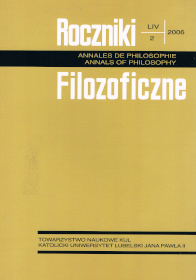Formułowanie problemów badawczych w nauce a uteoretyzowanie danych doświadczenia
Abstrakt
The purpose of the present article is to propose a research project which will analyse the issue of theoretization of empirical data which takes place in the process of formulating scientific problems. J. Hintikka’s interrogative model of inquiry will serve us as a starting point for our considerations. First, his proposal of viewing the theory-dependence of facts will be characterized. Then, with reference to the results of K. Jodkowski, three interpretations of theory-laden thesis will be given: a radical, a modest and a weak one. This will render it possible to further develop a critique of certain aspects of Hintikka’s conception. Subsequently, the critique will provide a basis for presenting a new way of viewing theory-dependence of empirical data. Some considerations regarding a possible use of the received conceptual scheme for analyzing certain problems of philosophy of science will close the article. A possibility of analyzing such classical problems as falsification and the use of the principle of auto-determinacy in science will also be offered. Lastly, with reference to A. Grobler’s analyses, a possibility of representing a process of rejecting metaphysical presuppositions in science will be considered.
Bibliografia
Belnap N. (1969): Questions, their presuppositions and how they can fail to arise, [w:] The Logical Way of Doing Things, Yeal University Press, New Haven, s. 23-37.
Franklin A. (1989): Can a Theory-laden Observation Test the Theory?, „British Journal of Philosophy of Science” 40, s. 229-231.
Freedman E., Smith L. (1996): The Role of Data and Theory in Covariation Assessment: Implications for the Theory-Ladenness of Observation, „Jornal of Mind and Behaviour”, 17(4).
Giedymin J. (1992): Konwencjonalizm geometryczny i fizykalny H. Poincarégo w sformułowaniu epistemologicznym, „Nowa Krytyka” 2, s. 3-30.
Gilman D. (1992): What’s theory to Do... with seeing? or some Empirical Considerations for Observation and Theory, „British Journal for the Philosophy of Science”, 43 (3).
Grobler A. (1993): Prawda i racjonalność naukowa, Inter Esse, Kraków.
Grobler A. (1991): Miedzy realizmem a instrumentalizmem: empiryzm konstruktywny, „Colloquia Communia” 1-3, s. 5-17.
Hajduk Z. (1986): Problemowa koncepcja badania naukowego, cz. I, „Roczniki Filozoficzne” 34, z. 3, s. 39-85.
Hajduk Z. (1987-1988): Problemowa koncepcja badania naukowego, cz. II, „Roczniki Filozoficzne” 36, z. 3, s. 54-47.
Hintikka J. (1992): Theory-ladenness of Observation as a Test Case of Kuhn’s Approach to Scientific Inquiry, „Proceedings of the Bienial Meetings of the Philosophy of Science Association”, s. 277-286.
Jodkowski K. (1984): Teza o niewspółmierności w ujęciu Thomasa S. Kuhna i Paula K. Feyerabenda, (Realizm. Racjonalność. Relatywizm, t. 35), Wyd. UMCS, Lublin.
Mehlberg H. (1966): O niesprawdzalnych założeniach nauki, [w:] Logiczna teoria nauki, PWN, Warszawa.
Rottschaefer W. A. (1976): Observation: theory-laden, theory neutral, theory free?, „Southern Journal of Philosophy” 14, s. 499-508.
Stegmüller W., (1976): The Structure and Dynamics of Theories, Springer-Verlag, New York–Heidelberg– Berlin.
Wiśniewski A. (1990): Stawianie pytań: logika i racjonalność, Wyd. UMCS, Lublin.
Zeidler P. (1992): Metody formalnej rekonstrukcji wiedzy naukowej a badania historyczne nad nauką, [w:] O związkach teoretycznych w filozofii nauki i psychologii, (Poznańskie Studia z Filozofii Nauki 12), PWN, Warszawa–Poznań.
Zeidler P. (1993), Spór o status poznawczy teorii. W obronie antyrealistycznego wizerunku nauki, Wyd. IF UAM, Poznań.
Copyright (c) 2006 Roczniki Filozoficzne

Utwór dostępny jest na licencji Creative Commons Uznanie autorstwa – Użycie niekomercyjne – Bez utworów zależnych 4.0 Międzynarodowe.





